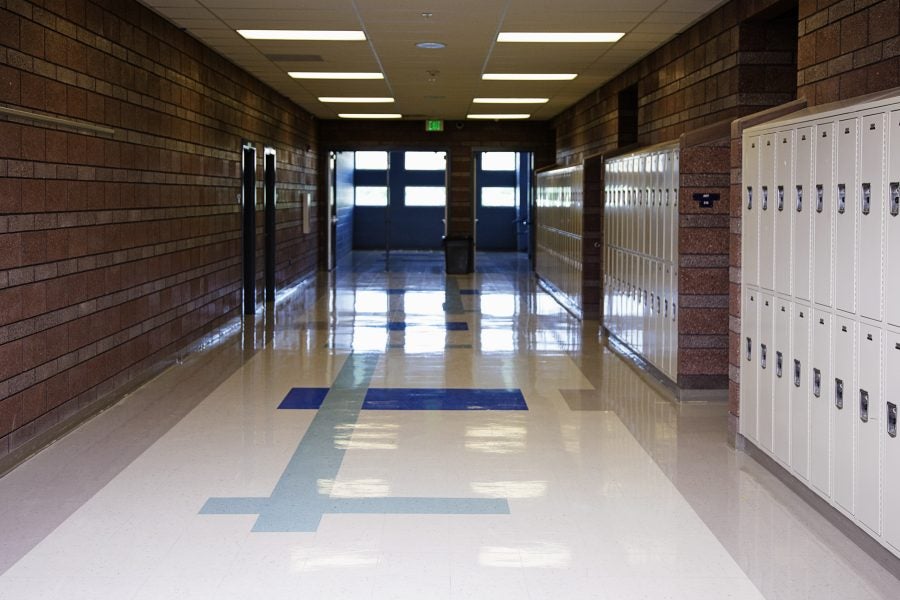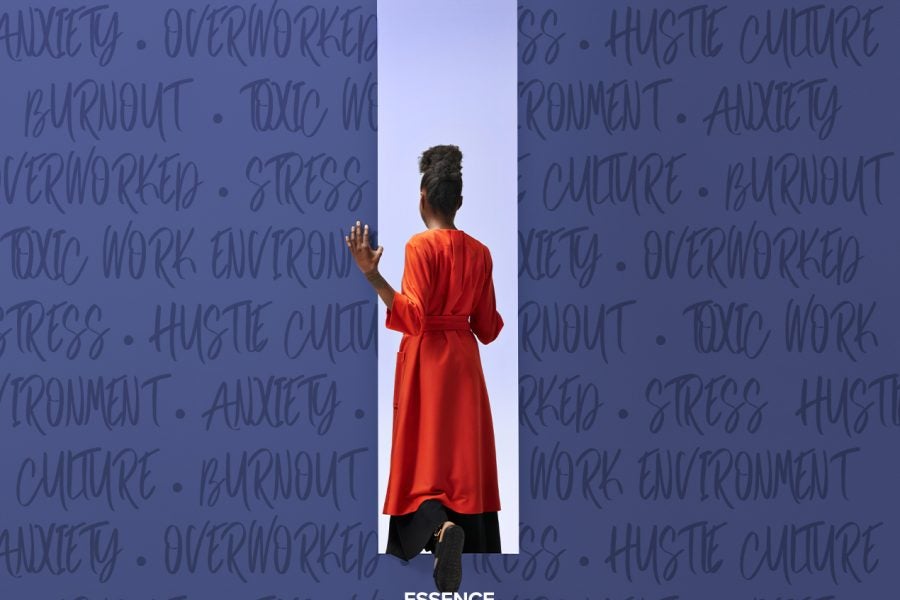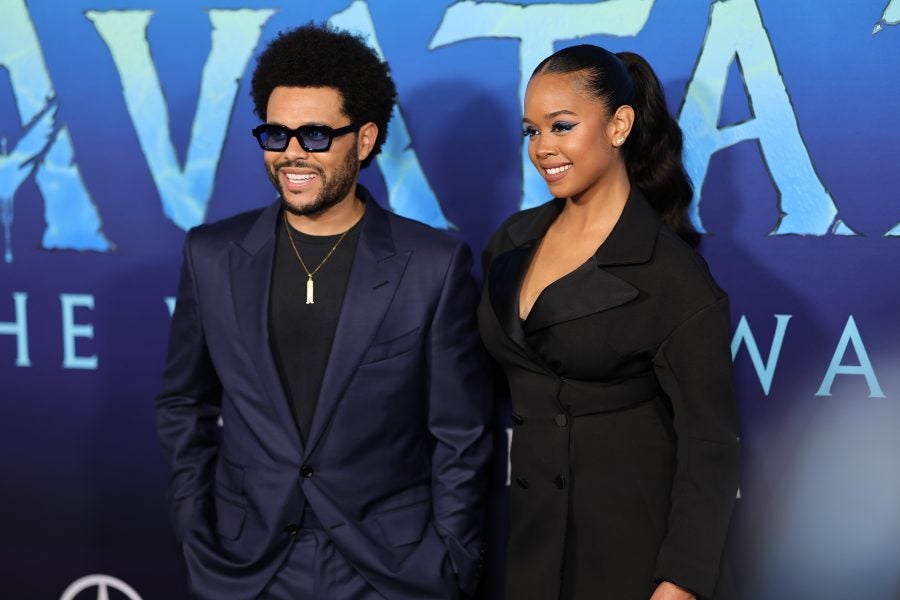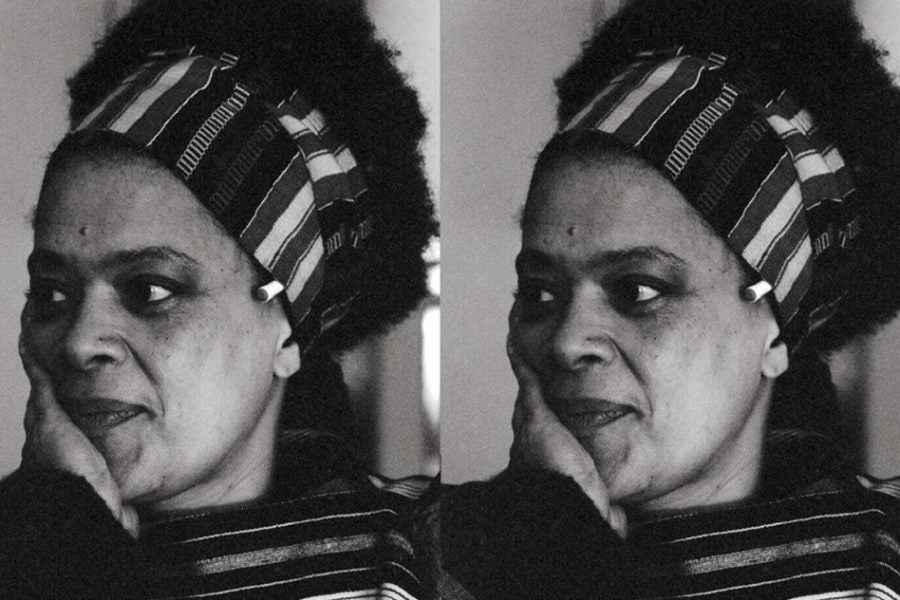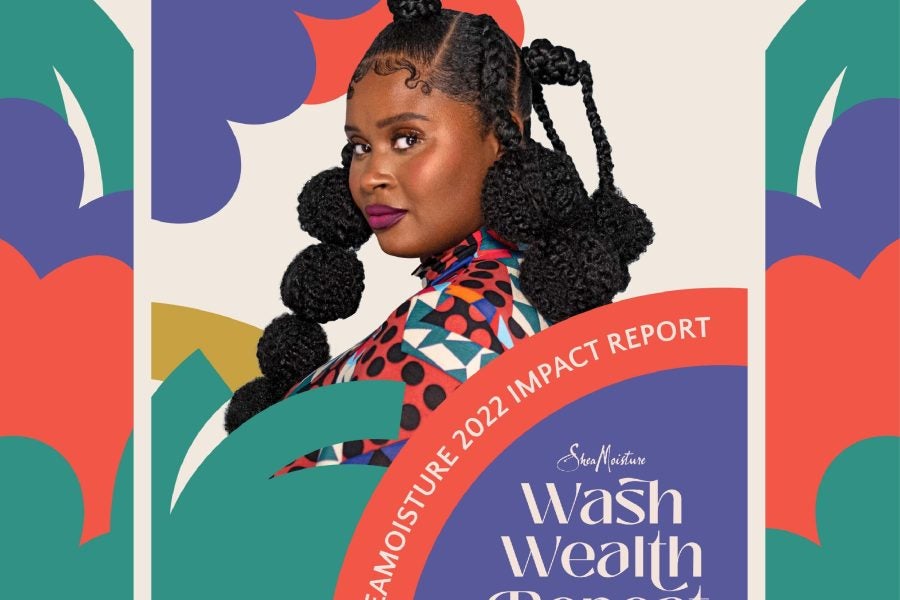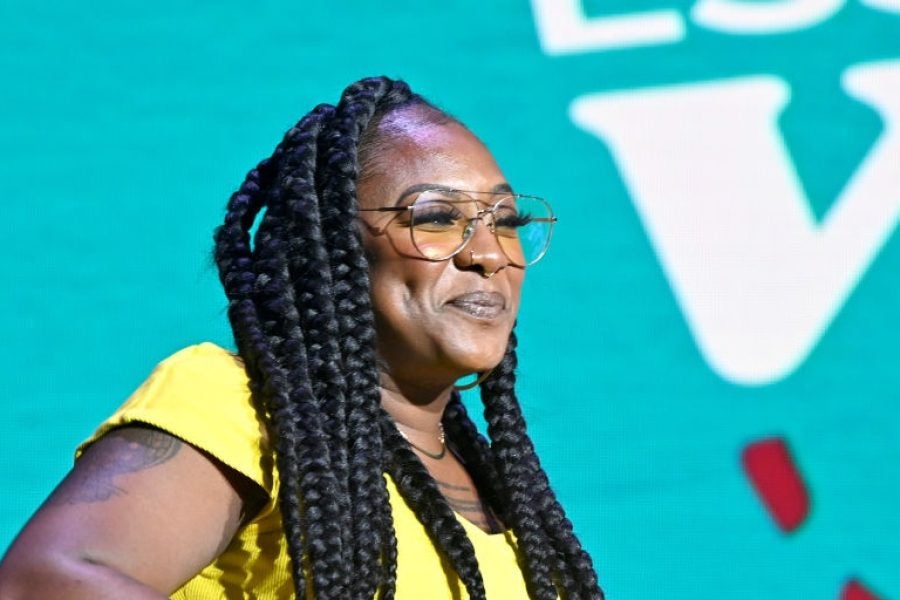
Every day, we inch closer to the 2022 midterm elections. For Black Americans, this is of the utmost importance because there has been a concentrated effort by some in power to turn the clock back to the days of old. With a lot of work to still be done, Alicia Garza—writer, Black Lives Matter co-founder, and one of the chief architects behind the Black Census Project—has stepped up to give our community a hand in addressing issues that continue to go overlooked by elected officials.
Billed as “the largest survey of Black people conducted in the United States since Reconstruction,” the Black Census Project is currently ongoing and a comprehensive survey of Black lives in America. With this year’s activation engaging more than 200,000 respondents, Garza and Black Futures Lab have crossed the country to poll the Black community on issues that are important to them for what they have called “Black Census Month.” The elevation of Black voices in the political landscape is much-needed, as pressing legislative and policy priorities become more and more each passing day.
ESSENCE had a chance to speak with Garza about the project, what Black voters may be surprised to learn once the survey is released, and how we can use what we learn for November’s midterm elections.
ESSENCE: For those just getting familiar with Black Census Month, may you explain its origins and why it is such an important project?
Alicia Garza: The Black Census Month is a part of the Black Census Project, the largest survey of Black people in America in 157 years. This year, 2022, we’re aiming to be the largest survey of Black people in America ever in history. To commemorate this incredible feat, we’ve established National Black Census Month with the goal of tapping into the ways in which we connect with each other around the issues that are important to us, and discussing what it is that we want to do about it.
August is typically a month where our people come together and enjoy the tail end of the summer months. Through family reunions and vacations, we wanted to play on the theme of bringing the Black family back together. It’s our time to come together as a family and tell ten of our friends to take the Black Census. For some of us, we’re hosting house meetings and block parties and using it as an opportunity to tap into our connections with each other and help advance this historic project.
ESSENCE: After conducting Black Census in 2018, what do you expect will be different in the 2022 census?
Alicia Garza: That’s such a great question! So much has changed in our lives since 2018. We’ve had our daily routines turned upside-down by a global public health crisis and seen a resurgence of white nationalist violence that’s pretty much out in the open. This year, we’re asking new questions that address our current reality. When Black Census was launched, we were at a pivotal moment in this country with a Trump presidency, which, as you and I both know, marked this country’s first real turn towards authoritarianism. Despite being looked at as comedy, a lot was happening policy-wise and practice-wise that wasn’t funny at all—especially as it related to our community.
This time around, we’ve made some really big strides while that administration was moving forward to take away our civil liberties. We’ve seen the bottom pulled out from under us when it comes to the economy, which means that our community can fall further into the hole that sets us back. I think what we’re going to see with this upcoming census and the release of the results is a snapshot of what’s changed from 2018 to now and also what new issues Black communities are activated around.
ESSENCE: Do you feel that due to all of these factors, there will be some surprises that you’re unexpectedly going to learn about?
Alicia Garza: It’s hard to say. We’re on the ground regularly in five states across the country: North Carolina, California, Georgia, Wisconsin, and Louisiana. In 2020, we talked to over a million Black voters in advance of the election, so we’re pretty tapped into what our communities want and need to see ahead of the 2022 midterms and 2024 presidential elections. What I think might be surprising for all parties is elected officials who haven’t been paying as much attention to what’s happening in our communities.
It’s commonly known that election seasons are times of strife for Black communities because there are two years, four years that go by where nobody talks to us or cares what we’re going through until we’re needed to keep them or put them in office. In very symbolic ways, people will come to our cookouts, our restaurants, and our festivals and try to relate to us culturally, but what often doesn’t happen is anyone relating to us legislatively.
What I’m hoping for from this project is that—through data—we can hone in on what Black communities are experiencing every day. This is bigger than some mainstream news narratives about Black communities. The other thing I think that will be revealed is that our communities have similar priorities as the rest of the country, but our lens is a bit different. Being Black in America means a lot of things to how we experience policy and practice daily.
In our last census, Black folks wanted to see white supremacists removed from law enforcement. That isn’t something massively covered by mainstream media, but it should be. Now that white nationalists are also serving in the federal government as elected officials, we are aware of the threat they pose to priorities that Black communities have.
ESSENCE: What are some further details about the events planned for August to mobilize the community around Black Census Month?
Alicia Garza: We have at least a dozen groups across the country who are hosting events right now. I had the pleasure of participating in an event with the New Georgia Project and from Black Voters Matter, where we were talking with young people about why the Black Census Project is important, why they should participate, but also what’s at stake in terms of participating in our communities around elections.
There are groups that we’re partnered with, such as the Transgender Cultural Center in San Francisco. They are doing a nationwide tour with the Black Census, where they’re talking to Black trans communities, getting folks to take the census, and not a lot of attention is being paid to which Black folks are being talked to. More than anything, we’re making sure that nobody gets left behind in this census.
We’ve also brought on several major national partners to help with this push. From Win With Black Women, which has been instrumental in the fight for the release of Britney Griner to the NAACP, which is excellent and huge; we’ve partnered with 50 Black women leaders from across the country to have them as a part of these efforts. We’re very excited to work with them.
“It is important for us to be able to make the rules and change the rules, so we’re not constantly chasing after tragedies.”
ESSENCE: This project is part of Black Futures Lab, so what inspired the shift from the Black Lives Matter Global Network to that?
Alicia Garza: I stepped away from Black Lives Matter Global Network in 2017 because what felt important to me was changing our relationship with the electoral system. The Black Futures Lab is an effort that comes out of that passion for Black people, and we need to demonstrate, protest, and stop bad things from happening when and before they take shape. It is also important for us to be able to make the rules and change the rules, so we’re not constantly chasing after tragedies.
This is a proactive project for me. The Black Census Project is the cornerstone of my work, and it’s an opportunity to do a massive listening project with a community that doesn’t get listened to. The Black Census Project is used to help resource grassroots Black-led and Black-focused organizations to over 1 million dollars. This year, we will exceed that as well. All of our partners who participate in bolstering the infrastructure of Black organizations will repeat this in 2023. The Black Census Project is the cornerstone of our organizing and storytelling work, where we’re able to tell new stories about who Black people are, what we, as a community, care about, and what we deserve from our government.
ESSENCE: Speaking of the government, a whole generation has come of age and witnessed tragedies from those their age and their background. With this year being the tenth anniversary of Trayvon Martin’s murder, where do you think we are now as a country after there was this “racial reckoning” in 2020?
Alicia Garza: That is a good question. Racial reckonings in this country are often short-lived, which has everything to do with the amnesia this country is built around. With this last surge of activity and protest, you can expect that there will be a period that follows where people attempt to figure out what the next steps are. It makes sense that young people are disillusioned by our government and by how they’re being left behind in every area you can imagine. At the same time, young people here are still at the forefront of efforts to make changes related to those issues. What we learn and how we become the adults that change the course of history is how we start to understand these cycles of change.
In what I’ve encountered in just over 20 years of doing this work, there is a bit of anxiety and cynicism that does come from youthfulness. This is a marathon, not a sprint, in that we have to win victories along the way, no matter how small they are. Those victories are built up into something much bigger, and they open up opportunities to change the direction of history. Whether it be from the last period with the Civil Rights movement or just from the last decade with Black Lives Matter, these things take time. However, we won’t wait for change to happen. It just means that what is necessary for us right now is to be relentless in our pursuit of a more equitable and just world.
As a result of our efforts, our patience, and our execution, we’ve changed the balance of power in Congress. We changed who was in the White House. We elected the first Black woman to be the governor of Georgia, despite running into a big stumbling block. You can see that indomitable spirit in the voters in Georgia who have an opportunity for a rematch this year. The way that we want to contribute to that is to be able to give our communities the tools and data needed to win. That’s where the Black Census Project comes in.
“We heard about a massive infusion from the federal government, but it didn’t reach the Black communities. Forty percent of those dollars have gone to law enforcement when they were supposed to go to housing assistance and financial support.”
ESSENCE: As we inch closer to November’s midterm elections—is there anything you and the Black Census Project have gleaned from data that can inform the Black community on what important issues we should be aware of?
Alicia Garza: There are a few things that folks should be paying attention to as we’re knocking on doors in North Carolina, California, Wisconsin, and Georgia. People are concerned about the economy, inflation—which is something Black people have dealt with forever—racial prejudice and bias, and people who are unable to articulate their plans to where our community can effectively get behind.
We are also finding through research that Black communities are discussing how we haven’t fully recovered economically from the COVID-19 pandemic. People are wondering aloud about where the COVID dollars went. We heard about a massive infusion from the federal government, but it didn’t reach the Black communities. Some FOIA [Freedom of Information Act] requests from local and state governments are being questioned about where that money went, but we’re not surprised about the results. Forty percent of those dollars have gone to law enforcement when they were supposed to go to housing assistance and financial support.
We have not seen that money go to education for kids who couldn’t attend school for the better of two years. It didn’t go to increasing and expanding healthcare access. Upon knocking on people’s doors, they know that the people behind these decisions are up for election this year, from the governorship to the Secretary of State. Folks must understand the relationship between how decisions are made about accepting or denying money, where it will go, and the people who decide how it’s used.
Black communities are super clear about what they want from the people who are allegedly representing us. From removing white supremacists, to implementing new rules for racist law enforcement, to increasing the scope of the Civil Rights Division at the DOJ, we need to pay attention to these things. Our reach and impact have reached the White House. President Joe Biden announced a United We Stand summit that compiles a lot of different stakeholders in the country to talk about what I mentioned as issues.
While that may be the first step, it indicates that the drumbeat is building and that this is no longer a problem that can be ignored. These are things worth paying attention to, and I think the Black Census Project will reveal that.
Kevin L. Clark is a screenwriter and digital media specialist, who works at the intersection of music, film, Black pop culture, and social justice. Follow him on @IAmKevitoClark.

